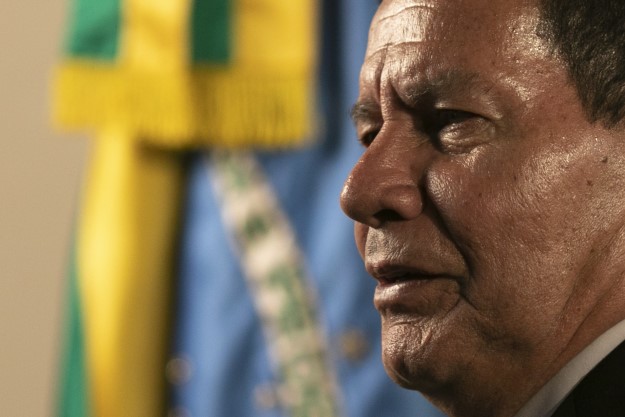On his first trip to China, Brazil’s vice president, general Hamilton Mourão, faces a tricky mission: convince his hosts, including President Xi Jinping, that Brazil is a reliable partner interested in maintaining strong ties. Mourão has tirelessly operated both behind the scenes and in the press to undo the damage done by President Jair Bolsonaro’s and Foreign Minister Ernesto Araújo’s fierce anti-China rhetoric.
The vice president wants to assure Chinese investors that Brazil regards China “not as a threat, but as a partner” and his efforts so far seem to have paid off. Chinese investors and diplomats now privately express confidence that a successful trip by Mourão can convince China’s leadership that he can control Bolsonaro and that his trip will officially put an end to the most difficult and uncertain period of the bilateral relationship since 1974, when, at the height of Brazil’s military dictatorship, then president General Ernesto Geisel recognized the People’s Republic of China.
Yet a closer analysis reveals that Mourão’s mission is even more difficult. Paradoxically, the vice president must be careful not to achieve too much during his meeting with Xi Jinping to avoid being attacked by the radical anti-globalist faction of the Bolsonaro government. This group has a strong influence on the Brazilian president and is deeply suspicious of Mourão, regularly accusing him of being a closet communist. Right-wing social media groups have seen a proliferation of images of Mourão together with Marx, Lenin and other communist figure heads. It is notable how China has become a topic in the struggle within the multiple factions that form the Bolsonaro government — and there lies the risk that Mourão’s mission in Beijing could backfire in a dramatic fashion. In the most extreme scenario, Bolsonaro could find himself pressured to disown his vice president vis-à-vis China and empower his conspiracy-peddling foreign minister, a move that could quickly undo any progress made in fixing the bilateral relationship.
Dangerous task
The reformed four star general can be expected to reap numerous ‘low-hanging fruit’ during his visit, ranging from better access to Chinese markets to a considerable number of investment deals, elevating economic ties in an unprecedented way. The fact that Xi agreed to meet Mourão is an unusual sign of goodwill, particularly considering how much the relationship deteriorated since Bolsonaro’s election in October 2018, with Beijing fearing Brazil could undermine Chinese geopolitical interests in Latin America and the Caribbean, where 9 of the 17 countries that still recognize Taiwan are located.
To make matters worse, the Brazilian government will soon have to make two highly symbolic decisions, making it harder for Mourão to keep the China agenda off the populists’ radar. First, Bolsonaro must make up his mind about whether to formally support China’s Belt and Road Initiative (BRI), an investment plan of unprecedented scale – and a key indicator of China’s global ambitions. While delaying signing a BRI memorandum would not have an immediate impact on investments (BRI is more about selling a narrative rather than operating as a formal investment program), it would be interpreted as a clear sign in Beijing that Brazil is susceptible to pressure from Trump, who asked Bolsonaro to help limit Chinese influence in Latin America.
Sensing an opportunity in Brazil’s ambiguous stance vis-à-vis China, other presidents in the region have moved closer to China, seeking to project themselves as more reliable partners. In April, Chile’s President Sebastián Piñera traveled to Beijing for the second Belt and Road Forum, where he directly challenged Brazil’s role as China’s key interlocutor in Latin America. Brazil’s adherence to the BRI would be seen as a major success in Beijing and Mourão could extract significant investment promises in return.
Secondly, Bolsonaro will have to decide whether to follow Trump’s lead and take concrete steps to limit the role of the Chinese technology giant Huawei in the roll-out of the next generation 5G mobile network in Brazil. Brazil’s industry, agriculture, telecommunication companies and the armed forces do not support such a move, but Brazil’s Minister of Science and Technology Marcos Pontes recently made clear, while speaking at a technology fair, that the decision about 5G was strictly political – rather than technical – and would thus be made by the president. Mourão argued in a recent newspaper interview that Brazil “did not share, for now” the U.S. view that Huawei could pass on strategic information to the Chinese government. For now it is unlikely that Brazil will follow the U.S. and Australia and ban Huawei’s participation in the rollout of the 5G network. The country’s position is likely closer to Europe, where governments have taken a more moderate stance and refused to ban Huawei. Still, Mourão will be crucial to helping Bolsonaro save face with his radical supporters who consider merely traveling to China as a capitulation to “Maoist China,” a term Araújo likes to use.
As Mourão makes his case in Beijing to save the bilateral ties, Chinese will listen carefully, keenly aware that Brazil’s intricate domestic dynamics will determine how Brazil positions itself in the context of growing great power competition between Beijing and Washington. The VP has to walk the fine line of heaping success in his mission to mend Brazil – China relations while keeping the same success as mute as possible – or face the fury of the radical right that sees Mourão as a threat.








